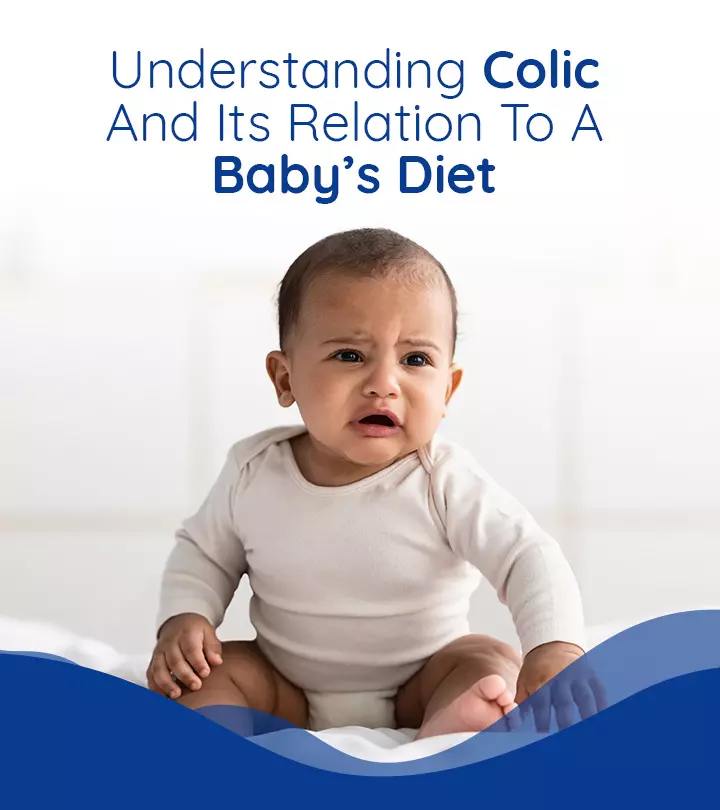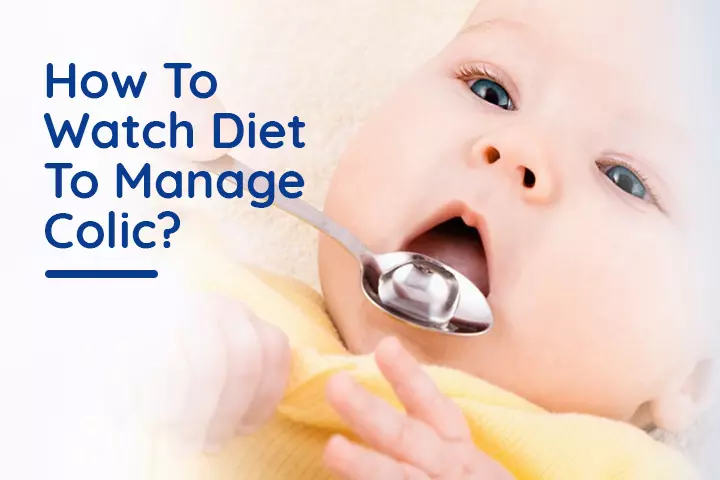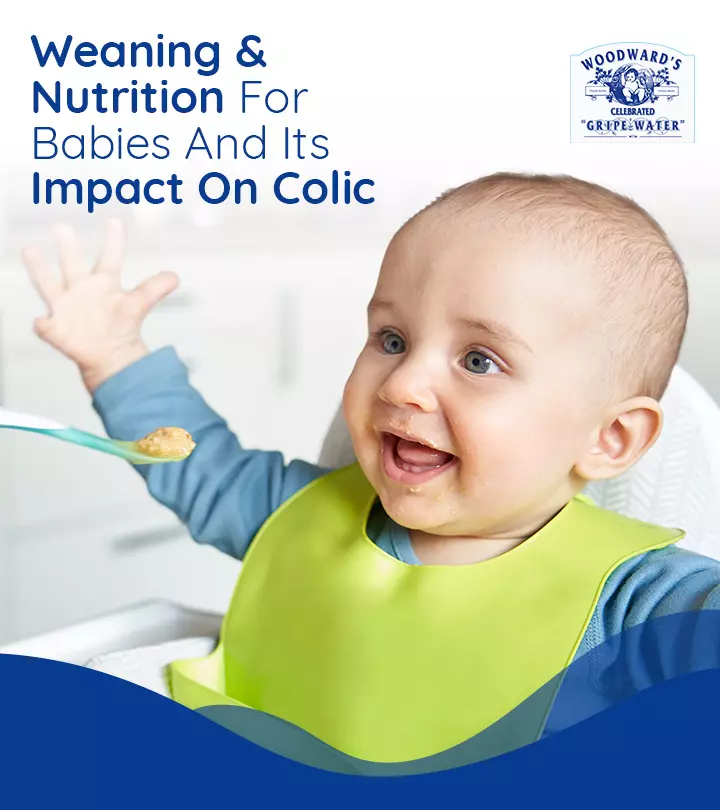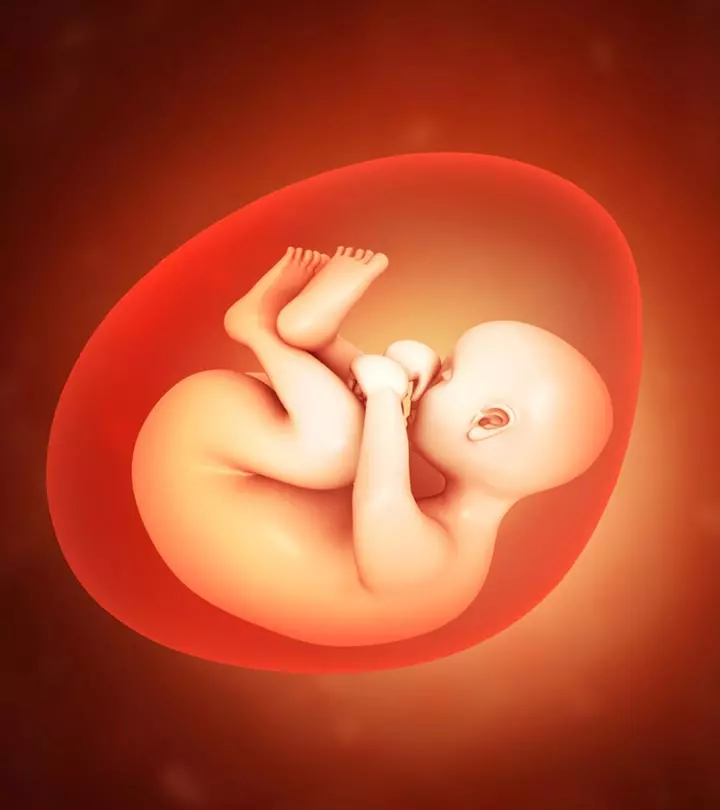

Image: Shutterstock
Babies cry all the time, but when that crying is persistent, prolonged, and shows no signs of abating, despite your best measures, then your baby may be diagnosed as having colic. Colic may be identified by prolonged episodes of uncontrollable crying in a seemingly healthy and well-fed baby and starts under three months of age. Frequent crying bouts can prove exhausting and distressing for both parents and the baby. Although there are no defined treatments for colic, there can be various reasons or factors why a baby might be colicky, and treatment usually varies with the trial and error method. The following details about colic can help you understand and cope with it better.
Possible Signs Of Colic
Colic can occur anytime in babies, from 3 weeks of life to 3 months of age (1), and usually reduces as they grow. Your baby may be suffering from colic if they exhibit the following symptoms.
- If your baby is crying frantically for a very long time and is not calming down no matter what tactic you use.
- They have a shrill, high-pitched cry which may sound like they are in pain.
- If your baby has a bloated stomach. This, however, may not be the case for all.
- If they have redness on their face due to excessive crying and pull their knees towards their abdomen or chest while crying.
- In terms of physical appearance, the baby seems quite robust but passes loose stool that seems to make them feel better (2).
- If they continue to cry shortly after a breastfeeding session.
Possible Causes Of Colic In Babies
- Sensitivity To Food Consumed By The Mother
There are no major restrictions on the food intake of a lactating mother, but if the baby is increasingly getting colicky, it may be that they are allergic or intolerant to certain foods that the mother is eating.
- Trapped Wind Or Gassiness
This happens when the baby is unable to burp or let the gas out after feeding. Since their digestive system is still in the developing stage, the air gets trapped and causes aches and pains.
- Reflux & Silent Reflux
The term ‘reflux’ is used to describe the condition where babies feel instantly sick after every feeding session. It also intensifies if the baby is laid down. However, silent gastroesophageal reflux occurs when acid formation in the baby’s gentle stomach causes discomfort to the baby.
How To Watch Diet To Manage Colic?
There are various ways to manage colic just by making simple changes to the mother’s diet and the breastfeeding baby.
- Cow milk – If one is unsure if the cow milk is causing colic or something else, avoiding consuming any dairy products for a while may give parents the answer. If they still suffer after the feeding sessions, the other possible causes may be soda, junk, and spicy food (3).
- Consuming nutrient-rich foods -Calcium, minerals, vitamin-rich foods, fruits, and vegetables that are non-cruciferous may help reduce colic. Green leafy vegetables, blackberries, and more help improve babies’ colic bouts (4). Healthy soups or stews can also be nutritious for you and your colicky baby. Consult the doctor before incorporating any changes to your postnatal diet.
- The ‘Hing’ remedy – This kitchen staple in Indian households can remind you of your childhood days when parents used to apply ‘hing’ or asafoetida around the belly button to cure stomach discomfort or colic problems. Hing has antimicrobial properties and can serve as a natural medicine.
- Gripe water – Another way is by introducing gentle and effective digestive care supplements like gripe water. This ayurvedic formulation contains Dill oil and Sarjikakshara that helps with digestion and acidity. Also effective during the teething period, gripe water makes weaning easier. It is advised to consult with your pediatrician to find the recommended dosage for your baby.
Coping With Colic
There is no known treatment for colic, but it can be managed or reduced with effective strategies and solutions (5). Read on to know about some strategies you may adopt at home to soothe your crying baby.
- Holding them the right way. Place the baby on your lap and gently massage their back to provide relief. If your baby has a bloated stomach and gas, hold them straight to let the air pass and avoid discomfort. Rock them mildly to put them at ease.
- Provide comfort. You can swaddle your baby cozily with a soft blanket or go for skin-to-skin contact. Sponge the baby and give them a bath with warm water. You can also use distractions with new, attractive objects or give a pacifier. Use gentle supplements meant for babies like gripe water for immediate relief from gassiness or acidity.
- Switch bottles regularly. Sucking milk from bottles can trap air in your baby’s stomach. Find the right bottle for your baby, and remember to replace it every few months to maintain hygiene.
Breast Milk is an effective health measure for both mothers and babies 6. Giving infants the right digestive liquids or medications doctors prescribe can improve gas and acidity. Anti-colic foods like leafy vegetables, papaya, apples, etc., can help calm colic. In this journey of healthy growth, colic sometimes poses a challenge, but it is a common phenomenon that reduces as the baby grows up 7. It can be overcome by using the right strategies.
References
- ‘Three Months’ Colic’
https://www.ncbi.nlm.nih.gov/pmc/articles/PMC2011617/?page=1 - Infantile Colic
https://cdn.mdedge.com/files/s3fs-public/jfp-archived-issues/1984-volume_18-19/JFP_1984-07_v19_i1_infantile-colic.pdf - Infantile colic in exclusive breast feed babies: A clinical dilemma
http://journals.lww.com/JSSR/pages/default.aspx - “THE GRIPE”: AN INTEGRATIVE APPROACH TO INFANT COLIC
http://www.lawrencerosenmd.com/wp-content/uploads/2013/10/Colic.pdf - Management of Infantile Colic: A Review
https://journals.sagepub.com/doi/abs/10.1177/0009922808323116 - The Baby-Friendly Initiative: Protecting, promoting, and supporting breastfeeding
https://academic.oup.com/pch/article/17/6/317/2638898?login=true - Infantile Colic: A Review
https://journals.sagepub.com/doi/abs/10.1177/146642400412400407
Community Experiences
Join the conversation and become a part of our nurturing community! Share your stories, experiences, and insights to connect with fellow parents.
Read full bio of Dr. Reema Pandya



















